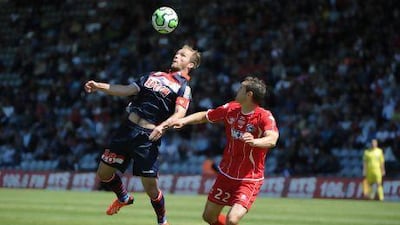The congratulations which winged their way to AS Monaco last weekend, when they sealed promotion from the second tier of French football, had been ready and pre-prepared for many days.
Any club owned by one of the wealthiest 120 individuals in the world, unique in French club football for having been in a Uefa Champions League final in the last decade, and top of their table for most of the season, hardly seals a place at the summit by sudden ambush.
Monaco should by the logic of their accumulated points have confirmed their ascent last month.
But they wobbled while closing in on the prize, and home supporters - a small group - disappointed by a home defeat against Caen a fortnight ago had to wait until last night to celebrate at the Stade Louis II, ahead of the visit by Le Mans.
Special gratitude went to Ibrahima Toure, once of Paykan and Ajman in the Pro-League, who sealed promotion with an injury time winner at Nimes last Saturday.
Monaco have been outside Ligue 1 for two seasons. Much has happened in that time.
A controlling interest in the club has passed from the Monagesque royal family to the Russian Dmitri Rybolovlev.
Armed with a fortune estimated by Forbes magazine to be worth around US$9.1 billion (Dh33.4bn), he is high-end wealthy even by the standards of Monte Carlo, home to a number of international billionaires, and he has given notice that he intends to exercise his financial muscle on behalf of Monaco that could put them in the sort of spending bracket occupied by the likes of Manchester City and Paris St Germain, to cite the freshest examples of clubs whose rise has been accelerated by massive overseas-investor funding.
Something else has happened in the two years since Monaco were relegated to Ligue 2.
It is a change in the presiding economic climate of southern Europe. France has moved deeper into a culture of austerity. Taxation policies, under the socialist government of Francois Hollande, have altered.
How does this affect football? Directly, in that a majority of Ligue 1 clubs resent higher corporation taxes and rising tariffs of income tax.
They say makes it even harder to recruit or keep good players, who can earn more, net, elsewhere in Europe.
The complaining clubs feel especially hamstrung as they watch PSG, under Qatari ownership these last two years and Ligue 1 winners this season, set new records for expenditure on salaries and transfer fees.
How does this impact Monaco? In theory, French laws on taxation should have no bearing on them.
The Principality of Monaco, where the club is headquartered, is outside French fiscal jurisdiction.
Yet they play in the French league. Historically, that anomaly has caused only sporadic indignation among rivals.
Players at Monaco, especially those from outside France enjoy tax advantages, which has often meant Monaco can outbid rivals for their services.
For much of the last century, the French football authorities tolerated the situation.
Monaco had a fine reputation for developing footballers who went on to great success with the national team - Thierry Henry, Lilian Thuram, David Trezeguet - and because the club was effectively bankrolled by the Monaco royal family, a sort of diplomatic détente existed.
With their small fan base, Monaco were deemed a quirky, if privileged, member of the French football family.
Europe was charmed when, unexpectedly, they reached the 2004 Champions League final, where they were beaten 3-0 by Jose Mournho's Porto.
But under a Russian billionaire, they look much more like a threatening juggernaut.
And AS Monaco have now been firmly told that their incongruous status must change. Either, say the league, they must be registered officially within France - and their attractive training ground, carved into the cliff face, overlooking the Mediterranean at La Turbie is in French territory - and obey French fiscal laws; or they must leave the league.
"We welcome the good news of Monaco's promotion," said Frederic Thiriez, president of the French league, when Toure's goal sealed promotion, "and we look forward to their conforming to French regulations."
Negotiations with the league are ongoing as Rybolovlev's advisers seek the possibility of compromise solutions to Monaco's status, some halfway house that would preserve a part of their tax advantages but also satisfy the French system. An argument in their favour is the fact that a strong Monaco, like a powerful PSG, will raise the global profile of Ligue 1.
Already Monaco are active combatants in the phoney war that is the last weeks before the opening of the summer transfer window.
Toure, despite registering his 17th goal of the campaign against Nimes, almost daily learns that names such as Falcao, of Atletico Madrid; Carlos Tevez, of City; Wayne Rooney of Manchester United, are targets to play up front in 2013-14.
"Whatever happens, Monaco will have a strong team next season," says Cladio Ranieri, the promotion-winning coach. Ranieri knows the club might well have a new man in his post, too, although any new employee will probably want to be clear on his tax liabilities before he commits.
Follow us


